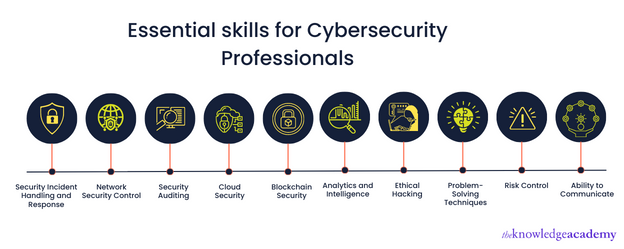We may not have the course you’re looking for. If you enquire or give us a call on 0800 446148 and speak to our training experts, we may still be able to help with your training requirements.
Training Outcomes Within Your Budget!
We ensure quality, budget-alignment, and timely delivery by our expert instructors.

According to the 2022 Official Cybercrime Report, the cost of cybercrime is estimated to grow to £8.72 trillion by 2025. The profession of Cybersecurity is in high demand, expanding quickly, and in need of qualified workers. It offers competitive median earnings, employment prospects across various industries, and a demanding, hectic work atmosphere.
The need for experts who can recognise Cyber Security attacks will keep expanding in the near future. Therefore, it is essential to learn the essential skills that will help you to develop your Cybersecurity career. To help you understand what it takes to be a professional in the Cybersecurity area, we've compiled a list of Top Cybersecurity Skills that are highly in demand. In this blog, you will learn the Top 10 Cybersecurity Skills required to build a career in Cybersecurity.
Table of Contents
1) Importance of Cybersecurity
2) How to develop your Cyber Security Skills?
3) Four ways to master Cybersecurity Skills
4) Top 10 Cyber Security Skills to learn in 2023
5) Conclusion
Want to master the art of preventing Cyber Security risks? Then register for the CCNA Cybersecurity Operation Training today!
Importance of Cybersecurity
The threat of information theft is expanding quickly, along with the rise in cybercrimes. The driving factor of cybercrimes is the release of identification information to the internet via cloud services. Cybercriminals' ways of attacking various security systems and their targets and tactics are getting more complex. In this rapidly changing global environment, the topic of Cybersecurity has a lot of potential. Every possible industry is in great need of Cybersecurity experts.
All types of businesses are at risk, including those in the healthcare, banking, entertainment, retail, consultancy, and sales sectors. Most businesses have sensitive information that needs to be protected, such as employee personal information, intellectual property, and private data. Companies all around are struggling with a lack of qualified/experienced Cybersecurity experts amidst the ongoing Cyber Security Breaches. The most important requirements for adopting Cyber Security Skills are:
a) Profound knowledge of the topic
b) Strong sense of curiosity
c) Knowledge of applications and systems
d) Adequate IT proficiency
How to develop your Cyber Security Skills?
Based on your background, a certificate or degree in Cybersecurity is a great place to start. They will provide you with a strong foundation in the fundamentals of Cybersecurity, as well as an overview of security across a number of platforms, programming, and development, digital forensic investigation, particular technical abilities (such as those relating to computer and operating systems and networking), and more.
There are more Cybersecurity degree programs offered to potential students, both online and on-campus, as a result of the expanding popularity of this sector. Whatever learning style you choose, you should search for a non-profit institution with a reputable Cybersecurity course that is regionally approved. It would be best to look for official verification from the higher education and Cybersecurity industries, such as official rankings, while choosing the institute. It requires you to have a hang on specific abilities to take up Cybersecurity jobs. Some of them are mentioned below:
a) Detailed understanding of technical aspects
b) Knowledge of securing data
c) Networking
d) Master system administration
Want to gain professional experience across a wide platform of Cyber Security sector? Then this Microsoft Cybersecurity Architect SC100 is the right fit for you!
Four ways to master Cybersecurity Skills
You may do a few things to develop the abilities you need if you want to work in this industry. Consider the following ideas:
a) Follow the most recent Cybersecurity headlines: It can be difficult to stay updated with news, but there are several Cybersecurity news websites, blogs, and publications that can be helpful. Leading sources of data on the cyber-economy, including employment figures and information on spending on cyber-security, are included in Cybercrime Magazines.
b) Participate in a training program or boot camp: You can learn the skills required to become a security analyst through a training program, frequently in less time than it takes to complete a degree program. Instead of a degree program, professionals in the Cybersecurity area frequently acquire their abilities through certificate programs and on-the-job training.
c) Take a Cybersecurity program: By engaging in extensive courses that lead to a degree, you can gain the skills required to work in this area. Many universities and colleges offer undergraduate and graduate Cybersecurity programs.
d) Attend conferences and read books about Cybersecurity: There are many outstanding publications and talks about Cybersecurity. These resources are a great way to start your Cybersecurity career.
Want to learn the method to identify attacks and risks before intrusion? You can sign up for the CompTIA Cybersecurity Analyst CySA+ Certification course for professional guidance from experts.
Top 10 Cyber Security Skills to learn in 2023

The need for Cybersecurity is at an all-time high as organisations increasingly go digital and use cloud storage. A Cyber Security professional needs to have a broad range of appropriate skills to fit the job roles in Cyber Security. Let's explore the top 10 Cybersecurity Skills needed for Cybersecurity:
Security incident handling and response
A Cybersecurity professional's primary duty is handling any ongoing threat or violation of an organisation's security policy and ensuring standard security practices. You must be able to cope with security breaches, including malware, ransomware, phishing, Advanced Persistent Threats, and Distributed Denial of Service (DDoS) attacks.
Network security control
"Network Security Control" describes several methods for enhancing network security. You need to be aware of how your network works and how routers, firewalls, and other hardware work. As a Cybersecurity professional, you must use a firewall (a piece of hardware or software that prevents your machine from receiving or sending internet information) to filter and stop unauthorised traffic from entering the network.
Security Auditing
For people working in Cybersecurity, auditing skills are extremely important. An in-depth knowledge of hardware configurations to user data is necessary for auditing skills. Organisations can find gaps in their security infrastructure through security audits. Throughout this test, security experts evaluate if security protocols comply with a set of predefined requirements. Additionally, auditing guarantees that businesses adhere to industry norms and legal regulations.
Cloud Security
Businesses employing cloud computing must ensure that no unauthorised individuals can access, use, or disclose their systems. Cloud security is important for Cybersecurity experts because many firms now keep their data and apps there. Security experts need to know how to install the system properly because human error creates the most considerable security risk in the cloud.
Blockchain Security
The level of security that Blockchain provides is one reason why it is becoming more and more widespread. Therefore, Cybersecurity experts should be aware of Blockchain technology and deal with security challenges. It is the best way to get ready for the future.
Analytics and Intelligence
To identify and detect attacks at the early stages, a security practitioner should be able to use analytics and intelligence. The security Professional can combine network and application data using analytics and intelligence to stop attacks from happening in the near future.
Ethical Hacking
Because most Cybersecurity experts need to learn how to "ethically hack," they must understand how networks and infrastructure can be attacked in the first place to safeguard an organisation's network and infrastructure effectively. In short, you need to possess hacker-level skills, which is a vital part of technical skills in Cybersecurity. These skills allow you to thoroughly comprehend how a system works and develop efficient defences against these cyber-attacks.
Problem-Solving Techniques
In your day-to-day work as a Cybersecurity specialist, problem-solving will be essential. Conducting an independent investigation and addressing the challenges you run into is a necessary component of overcoming Cyber Security problems. One of the most important skills in the cybersecurity industry is the capacity to troubleshoot problems and come up with solutions.
Risk Control
Analysing the threats that a specific industry and business faces are part of Cyber Security Risk Management. It calls for combining technical and non-technical abilities, including critical analysis, creative thought processes, effective communication, and problem-solving.
Ability to Communicate
Since you will be collaborating closely with people in various departments and jobs as a Cybersecurity professional, it's essential that you clearly express your discoveries, worries, and solutions to others. Speaking clearly and concisely about Cybersecurity strategy and policy is vital, as is being able to explain technical concepts to people with varying degrees of technical knowledge.
Conclusion
A vibrant, quick-paced job path is Cybersecurity. You can start filling the Cybersecurity jobs gap immediately by developing most in demand cybersecurity skills through ongoing education, certifications, and on-the-job upskilling. This blog serves as a quick guide for the top 10 skills required for Cybersecurity.
Enhance your Cyber Security Skills for better employment prospects by signing up for this CISSP Training course today.
Frequently Asked Questions
Upcoming IT Security & Data Protection Resources Batches & Dates
Date
 Certified Cyber Security Professional (CCS-PRO)
Certified Cyber Security Professional (CCS-PRO)
Fri 17th Jan 2025
Fri 7th Mar 2025
Fri 23rd May 2025
Fri 18th Jul 2025
Fri 12th Sep 2025
Fri 14th Nov 2025
Fri 12th Dec 2025







 Top Rated Course
Top Rated Course




 If you wish to make any changes to your course, please
If you wish to make any changes to your course, please


